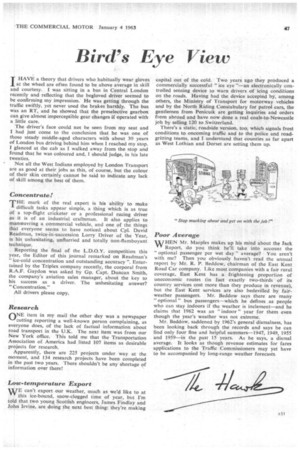Bird's Eye View
Page 49

If you've noticed an error in this article please click here to report it so we can fix it.
THAVE a theory that drivers who habitually wear gloves
at the wheel are often found to be above average in skill and courtesy. I was sitting in a bus in Central London recently and reflecting that the begloved driver seemed to be confirming my impression: He was getting through the traffic swiftly, yet never used the brakes harshly. The bus was an RT, and he showed that the preselective gearbox can give almost imperceptible gear changes if operated with a little care.
The driver's face could not be seen from my seat and I had just come to the conclusion that he was one of those steady middle-aged characters with about 30 years of London bus driving behind him when I reached my stop. I glanced at the cab as I walked away from the stop and found that he was coloured and, I should judge, in his late twenties.
Not all the West Indians employed by London Transport are as good at their jobs as this, of course, but the colour of their skin certainly cannot be said to indicate any lack of skill among the best of them.
Concentrate!
THE mark of the real expert is his ability to make difficult tasks appear simple, a thing which is as true of a top-flight cricketer or a professional racing driver as it is of an industrial craftsman. It also applies to
• manoeuvring a commercial vehicle, and one of the things that everyone seems to have noticed about Cpl. David Readman, twice-in-succession Lorry Driver of the Year, is his unhesitating, unflurried and totally non-flamboyant technique.
Reporting the final of the L.D.O.Y. competition this year, the Editor of this journal remarked on Read man's "ice-cold concentration and outstanding accuracy ". Entertained by the Triplex company recently, the corporal from R.A.F. Gaydon was asked by Gp. Capt. Duncan Smith, the company's aviation sales manager, about the key to his success as a driver. The unhesitating answer? "Concentration."
All drivers please copy.
Research
ONE item in my mail the other day was a newspaper
cutting reporting a well-known person complaining, as everyone does, of the lack of factual information about road transport in the U.K. The next item was from our New York office. This told me that the Transportation Association of America had listed 107 items as desirable projects for research.
Apparently, there are 225 projects under way at the moment, and 134 research projects have been completed in the past two years. There shouldn't be any shortage of information over there!
Low-temperature Export wE can't export our weather, much as we'd like to at " this ice-bound, snow-clogged time of year, but I'm told that two young Scottish engineers, James Findlay and John Irvine, are doing the next best thing: they're making
capital out of the cold. Two years ago they produced a commercially successful "ice eye "—an electronically controlled sensing device to warn drivers of icing conditions on the roads. Having had the device accepted by, among others, the Ministry of Transport for motorway vehicles and by the North Riding Constabulary for patrol cars, the gentlemen from Penicuik are getting inquiries and orders from abroad and have now done a real coals-to-Newcastle job by selling 120 to Switzerland.
There's a static, roadside version, too, which signals frost conditions to oncoming traffic and to the police and roadgritting teams, and I understand that counties as far apart as West Lothian and Dorset are setting them up.
Poor Average
WHEN Mr. Marples makes up his mind about the Jack " Report, do you think he'll take into account the "optional passenger per wet day" average? You aren't with me? Then you obviously haven't read the annual report by Mr. R. P. Beddow, chairman of the East Kent Road Car company. Like most companies with a fair rural coverage, East Kent has a frightening proportion of uneconomic routes (in fact exactly two-thirds of its country services cost more than they produce in revenue), but the East Kent services are also bedevilled by fairweather passengers. Mr. Beddow says there are many " optional " bus passengers—which he defines as people who can stay indoors if the weather is inclement—and he claims that 1962 was an " indoor " year for them even though the year's weather was not extreme.
Mr. Beddow, saddened by 1962's general dismalness, has been looking back through the records and says he can find only four fine and helpful summers-1947, 1949, 1955 and 1959—in the past 15 years. As he says, a dismal average. It looks as though revenue estimates for fares applications to the Traffic Commissioners may yet have to be accompanied by long-range weather forecasts.








































































































